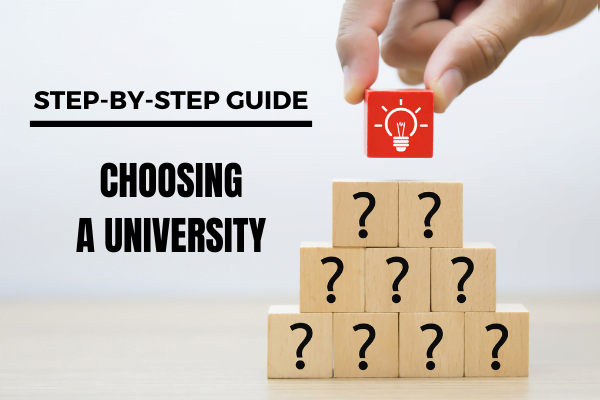Table of Contents
- How to choose a university | Here’s what you should know!
- How to choose a university | Availability of your program
- How to choose a university | Location and community
- How to choose a university | The curriculum
- How to choose a university | Requirements and admission criteria
- How to choose a university | Tuition and financial aid
- How to choose a university | Acceptance rate
- How to choose a university | Faculty
- Key takeaways
- FAQs
How to choose a university | Here’s what you should know!
Finding and shortlisting universities is the first step towards achieving your dream of studying abroad. While having a dream university in your mind is good, it is equally important to shortlist a few other universities as a backup. Shortlisting universities according to your preference isn’t as difficult as it seems if you know what exactly to look for in a college. Here, we have listed some top factors that will tell you exactly how to choose a university when you think of studying abroad!
How to choose a university | Availability of your program

Some programs, such as Arts, Business Administration, Science, etc., are available in almost every university. However, if you are looking for a specialized program (like financial computing), there are chances that it might not be available at your dream university.
So before you shortlist the university, make sure to look for the availability and the details of your desired program. It can be one of the top factors in how to choose a university.
How to choose a university | Location and community

As a student living away from home, it is necessary to find a safe community to live around. Try finding a university with accommodation options in a safe, friendly neighborhood.
You could also look for a location that has companies near the campus. This will make finding a summer internship and a training program easier. For example, some of the most frequented states and best places in the USA are New York, Massachusetts, and California.
How to choose a university | The curriculum

An engaging curriculum goes a long way in holding the students’ interest in their education. If you choose a graduate program, make sure it does not have too many courses that have been covered in your undergrad classes. It is also necessary to check that the core courses cover your area of study. You can find the courses offered in the program on the university website.
How to choose a university | Requirements and admission criteria

Criteria are one of the top factors in choosing a college. This must be researched thoroughly on the university website or other mediums. It is necessary to check the minimum GPA required to get into a particular university.
Keep in mind that not every university asks for GRE/GMAT and IELTS/TOEFL scores. It is easier to shortlist the universities and measure the chances of getting accepted by checking the admission criteria on the university website.
How to choose a university | Tuition and financial aid

Funding is always a hurdle in your dreams of studying abroad. Tuition fees for international programs usually range from $14,000 USD to $60,000 USD.
If funding is an issue, you should consider the various scholarships and financial aid options offered. Scholarships can cover the full tuition or some amount of your tuition fees. And almost every college offers financial aid to the students that deserve it, and for an international student, it is certainly one of the top factors in choosing a college.
Consider the colleges offering high financial aid. There are various scholarships for Indian students in the USA, such as Nehru Full-bright Scholarship, Inlaks Shivdasani Foundation Scholarships, Tata Scholarship for Cornell University, Stanford Reliance Dhirubhai Fellowship, and S N Bose Scholars Program.
How to choose a university | Acceptance rate

Checking the university’s acceptance rate can also help you predict your chances of getting in. Universities with high acceptance rates tend to accept students from every academic background. On the other hand, universities with low acceptance rates will take in selective students. Narrow down the universities with higher international student acceptance rates and apply!
How to choose a university | Faculty

It’s true that all the points mentioned above will tell you exactly how to choose a university abroad. But there’s one more thing you should consider – the faculty. If the teachers are currently involved in research or are really well-known, that could be an amazing bonus. After all, one of the most important things about studying at your dream university is the quality of education.
At iSchoolConnect, we strive to make the shortlisting process as simple and easy as possible. Our experts will guide you through shortlisting the universities and finding the program that will be the best fit for you based on your scores and preferences.
Happy shortlisting!
Read more: The Future of University Enrollment
Key takeaways
- Finding and shortlisting universities is the first step towards achieving your dream of studying abroad.
- While having a dream university in your mind is good, it is equally important to shortlist a few other universities as a backup.
- Shortlisting universities according to your preference isn’t as difficult as it seems if you know what exactly to look for in a college.
- Before you shortlist the university, make sure to look for the availability and the details of your desired program.
- As a student living away from home, it is necessary to find a safe community to live around. Try finding a university with accommodation options in a safe, friendly neighborhood.
- An engaging curriculum goes a long way in holding the students’ interest in their education.
Was this blog informative? If so, please share your thoughts in the comments below. Click here to reach out to us for more information on how to choose universities. We would be happy to assist you with your queries!
Liked this blog? Then read: Top study abroad student grants available now
FAQs
Q1. How do students choose their university?
Answer – 80% of students pointed to one of seven reasons behind their final decision: affordability, desired program, career outcomes, reputation/academic quality, value, proximity to home, and of course, that elusive “fit.”
Q2. Why do you need to choose the right university?
Answer – The most usual path to get better career opportunities highly depends upon selecting the right college. However, when most aspirants enter college, they do not even know what they want to achieve in the future; some want a secured job with high pay and security.
Q3. What qualities make a good university?
Answer – A good quality institute blooms in an environment that fosters competitiveness, creative thinking, innovation, and so forth. It provides a learning environment that encourages working on innovative projects in order to promote holistic personality development for nurturing future leaders.






